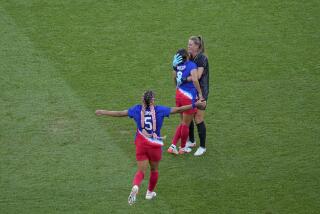LILLEHAMMER / ’94 WINTER OLYMPICS : ANALYSIS : Taylor Never Lit Flame for U.S. Team
- Share via
LILLEHAMMER, Norway — What does it say, when the caliber of play in the Olympic hockey tournament is at an all-time low, and the competition more even, that the U.S. team has slipped from fourth place two years ago to no higher than seventh here? That an American team has not won a medal since 1980, its longest drought in Olympic competition?
It says that the United States, even though it is producing more skillful players than ever, still can’t match the deep talent pools available to Russia, Sweden, Canada and Finland. And it says there’s something lacking at the coaching level, too.
From Lou Vairo, who could barely stand on skates when he misled the 1984 team to a seventh-place finish at Sarajevo, through the rude defensiveness of Dave Peterson in 1988 and 1992 to Tim Taylor, who was incapable of moderating his team’s emotional temperament, U.S. coaches have failed at the Games.
Perhaps not even the most brilliant strategist could have compensated for all the talent lost to the NHL, and maybe the skill just isn’t there on defense. But the shortcomings behind the bench made a difficult situation worse.
Taylor is intelligent, articulate, loyal to his players and idealistic. Maybe too idealistic.
When Canada’s offense proved punchless in pre-Olympic play, Coach Tom Renney sifted through half a dozen players until he found a mix that produced goals and chemistry.
Finland added nine new players after a 6-2 loss to the United States at the Izvestia tournament two months ago and crushed the U.S. here, where it mattered, 6-1. Russia sifted through two teams before compiling a squad that’s in the tournament semifinals.
Aware all along that his team was young and impetuous and might react badly under Olympic pressure, Taylor still made only two late changes. The addition of forwards Ted Drury and Peter Ciavaglia was planned well in advance, but in Drury’s case, it didn’t help the team’s maturity or add the on-ice leadership. The team never improved, never peaked.
To some extent, Taylor was limited by his meager resources.
But he has to take responsibility for not being able to read or change his team’s personality.
The players took their emotional cues from him. And Taylor stood there, barking commands without expression, arms folded across his chest.
After taking a 1-0 lead over a good Swedish team in their fourth preliminary-round game, the U.S. players should have been flying. When they went flat instead, Taylor did nothing to rekindle the fire.
And his assistant, John Cunniff, also a clever strategist but as emotionless as Taylor, kept his hands in his pockets.
The players lost their edge--and the game.
This team began dropping out of medal contention in its opener, when it couldn’t hold leads of 1-0 and 2-1 over a bumbling French team and needed a late, two-goal rally to pull out a tie. Rallies against Slovakia and Canada continued to deplete the emotional resources of the U.S. team.
“I think (France) was the key game,” Ciavaglia said. “Instead of getting a big win and starting off in a confident way, it got us off balance and kept us off balance a little bit. The whole tournament, with the exception of the one game against Italy (a 7-1 victory), never went the way we had diagramed it.”
Taylor didn’t do enough to turn the tide of undisciplined play, although the players’ lack of self-control might have been one reason they were available to the Olympic team and not in the NHL. But the suspicion lingers that he simply didn’t make the most of what he had, and that’s the real pity.
After a 5-3 loss to the Czech Republic on Thursday night, which means the United States can finish no better than seventh, Dave Ogrean, the executive director of USA Hockey--the sport’s national governing body--said the organization does not fault Taylor.
“I don’t think there should be any second-guessing, and there certainly is no second-guessing internally,” Ogrean said.
More to Read
Go beyond the scoreboard
Get the latest on L.A.'s teams in the daily Sports Report newsletter.
You may occasionally receive promotional content from the Los Angeles Times.







